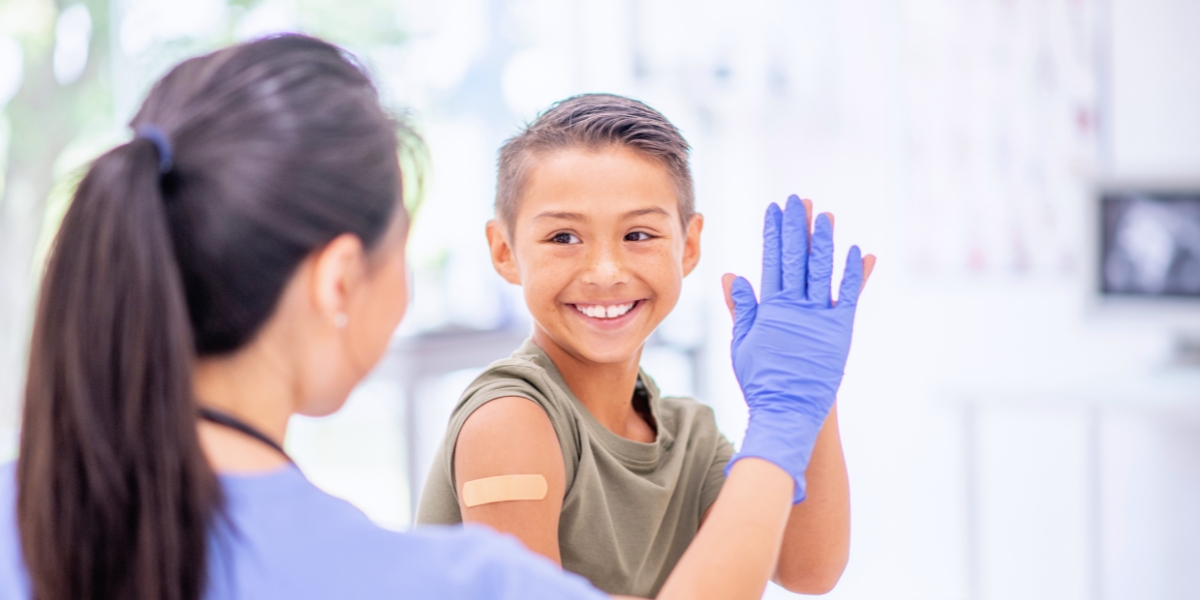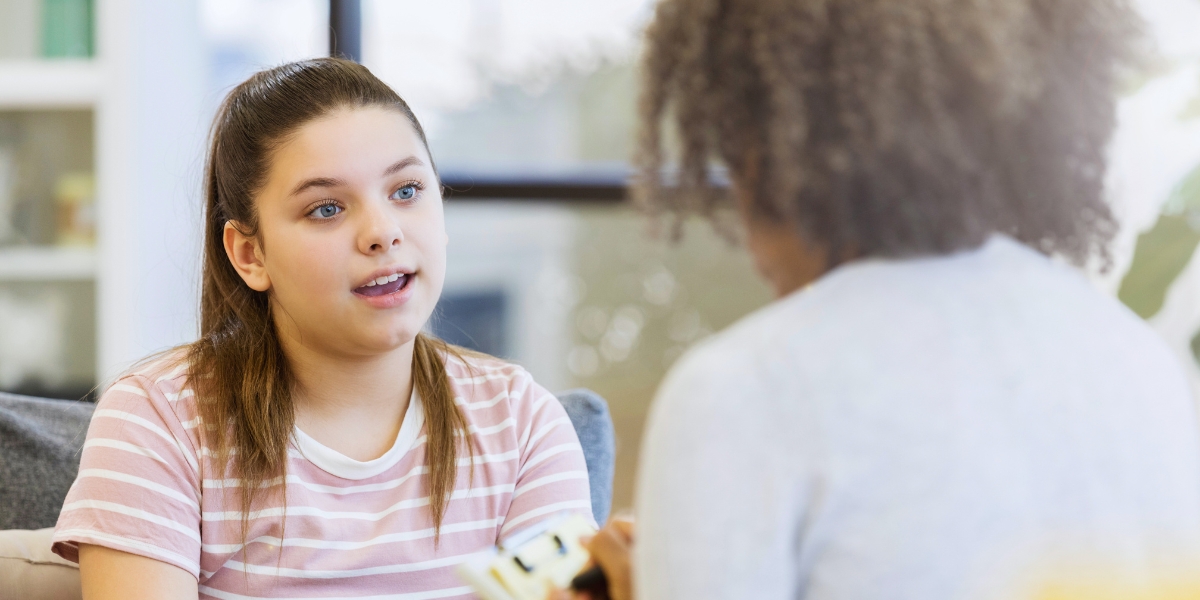
Despite the proven effectiveness of the human papillomavirus (HPV) vaccine in preventing certain cancers, vaccine uptake among youth in Canada remains below the 90 per cent target. Why is that? And how can we ensure young people and their families have the information they need to make informed decisions about vaccination?
We sat down with Dr. Hana Mitchell to explore these questions and discuss her recent research on the ways school-based immunization programs in British Columbia (BC) could do more than simply deliver vaccines. These programs could become key players in providing effective and timely education to students and their families.
Dr. Mitchell is an infectious disease pediatrician at BC Children’s Hospital and a researcher at the Vaccine Evaluation Center at BC Children’s Hospital Research Institute (BCCHR). She co-authored “Opportunities for HPV vaccine education in school-based immunization programs in British Columbia, Canada: A qualitative study,” published in Human Vaccines and Immunotherapeutics.
In this Q&A, adapted from the Best Lives podcast episode of the same name, Dr. Mitchell shares insights on vaccine education, barriers to HPV vaccine uptake, and how we can better support students and parents in making confident, informed choices about vaccination.
What inspired you to study HPV vaccine education?
As an infectious disease pediatrician, I know that vaccines are one of the best ways of preventing infections. But for people to get vaccinated, they have to be aware of a vaccine, have access to it, and understand a bit about why it’s recommended.
In Canada, we use school-based vaccination programs to vaccinate as many children as possible against vaccine-preventable diseases, including HPV. Traditionally, these school-based programs have focused on delivering vaccines. We wanted to know whether our school-based vaccine programs in BC could also provide opportunities to inform children and their families on the importance of vaccines. And hopefully, therefore, encourage them to get vaccinated and contribute to vaccine knowledge and confidence going forward.

Why is the HPV vaccine important and why is it offered to students in Grade 6 in BC?
HPV stands for human papilloma virus, and that’s a sexually transmitted virus that can cause a number of cancers in males and females. These cancers usually happen in adulthood to people in their 30s and 40s. We are so fortunate because the HPV vaccine is extremely effective in preventing infections and therefore preventing cancers. For example, in females who have never been infected with HPV, the vaccine prevents almost 100 per cent of cervical cancer that the virus can cause.
In BC, we use school-based vaccination programs in Grade 6 to give the vaccine. There are two reasons why we give the vaccine to children rather than adults. The first one is really simple: children develop a better immune response. Their bodies “remember” the vaccine better and they need fewer doses of the vaccine to achieve the same effect. Secondly, it is best to be vaccinated before you’ve ever been exposed to the virus. What that means is that the vaccine is best given to children before they reach adolescence and before they start having sex.
Despite the availability of the HPV vaccine for youth in Canada, uptake is still below the 90 per cent target. What are some of the barriers that contribute to this lower coverage?
There are barriers to vaccine coverage on several levels. I’ll start with individual ones. It is a somewhat newer vaccine, offered in BC for girls since 2008 and for boys since 2017. Many parents may have heard about the HPV virus, but would not have been vaccinated when they were going through school themselves. And for some people, the fact that this is a newer vaccine has led to some uncertainty. People also may not understand why a vaccine that prevents infections or cancers that happen to adults is recommended for children who are school age.
Also, even though we now recommend the vaccine for everyone, earlier messaging focused on this being a vaccine for girls and young women. That messaging may have stuck, influencing choices to this day.
On a public health level, the school-based vaccine programs were severely disrupted by the COVID-19 pandemic. In 2020, very few were vaccinated through schools and we’re just now starting to catch up.
Outside of the pandemic, school-based vaccination programs are a great way of reaching children, but they’re not perfect. School-based vaccination programs require consent and some children have trouble returning consent forms — for various reasons outside their control.

HPV vaccine education isn’t part of the BC Grade 6 curriculum. What are the potential impacts of this educational gap on students’ knowledge and confidence around vaccines?
School education is so important. We know that the teenage years are the time when we start making a lot of our own decisions — about what clothes to wear, how to spend our weekends, and increasingly about our health. I think schools are places where students can get reliable scientific information that helps them think critically and make well-informed decisions about many things in life, including vaccines.
We know that not everyone talks about vaccines at home. Parents might not know what to talk about, as we found in our study. They might not feel comfortable talking about vaccines, especially vaccines that prevent sexually transmitted infections, and they might hope that this will be done in school or at a health-care provider’s office.
Grade 6 students who are otherwise healthy have limited opportunities for health-care providers to talk to them about vaccines. They’re unlikely to look up vaccine information online. If they do, depending on the student, they may or may not know where to look for reliable information.
I think that many who do get the HPV vaccine through school-based vaccine programs actually don’t really understand why they’re getting it. Likewise, if they didn’t get the vaccine, they do not know what they did not get vaccinated against.
So I think that talking about vaccines in school in an objective, factual way provides an important opportunity to hear about vaccines and receive reliable science-based information. It also gives children the language to talk about vaccines, ask questions, and know where to look for quality information. Vaccine knowledge and confidence depend on many factors that evolve over life. But I think that vaccine education in school is one of the best ways of providing children with a solid foundation and knowledge about vaccines that they can then build upon.
The biggest concerns for students in your study were vaccine-related anxiety and fear of needles. What strategies could schools implement to improve vaccination experience?
Students had a lot to say about vaccines. One of the things that kept coming up over and over when we talked to Grade 6 students was that they’re not afraid of the vaccine itself or the side effects. They’re afraid of the needle and the pain of getting the shot. A lot of them said, well, if we knew why we were getting the vaccine and what the vaccine is helping prevent, it wouldn’t take away the pain from the needle or that fear, but it would make it more acceptable, more bearable.
Other things that students and teachers told us:
Students like having trusted people around to support them. Teachers play a key role, not just in logistics, but also in offering reassurance. Simply having a trusted teacher nearby — providing encouragement and letting them know it’s okay — meant a lot to students.
Honesty from the nurses and teachers was important. Students like hearing the truth; they don’t want to be told that it’s not going to hurt or that it’s not stressful. Acknowledging that this is hard and that it’s okay to be worried was important to students.
Distractions help a lot. All children across the board thought that vaccine days should be more fun. You know, like having some games, therapy dogs, or music. It obviously boils down to logistics and what’s doable on a vaccine day, but adding a bit more colour and fun would go a long way in making it a more positive experience for students.
Parents play a crucial role in deciding whether their child gets the HPV vaccine. How can schools and health-care professionals better support parents in this role?
In Grade 6, students need parental consent to be vaccinated. As a way to “catch up,” students in Grade 9 have the option to provide mature minor consent. But in Grade 6, it really boils down to whether the parent has consented or not.
Schools should make consenting as easy as possible for parents. In our study, we found that many schools already do a really good job of reaching the parents in a way that’s convenient for them. That might include a follow-up phone call or scanning the form rather than relying on a student to bring a paper form home. And then having a nurse available to answer any questions parents might have.
Parents also told us that they would like to know more about what school immunization day will look like. Who will be there to support their child? How will it all go? Just so that they feel reassured about the vaccine experience itself.
And for health-care providers, I can’t emphasize enough how helpful it is to have school-based nurses, because they can provide vaccine-related information to parents ahead of time. Schools can provide general education, but families very much look up to nurses and physicians for health-related advice for their child.
Health-care providers can help by reminding families about vaccines ahead of time, even if that’s not the reason why they’re seeing them that day. Because when the consent forms and the vaccine information sheets arrive, parents often don’t have a lot of time to decide. I think it’s really important for those conversations to happen ahead of time when everyone has had a bit of time to think, ask questions, and hopefully consent and agree to have the vaccine by the time the school vaccine day comes around.
If you could make one policy change to improve HPV vaccine education in BC schools, what would it be?
I would say, make vaccine education consistently part of the curriculum using the resources that we already have and link it to the vaccine immunization programs. So if you are giving a specific vaccine in Grade 6, why not provide education about that vaccine ahead of time to everyone involved? While the decision to get vaccinated is individual and up to caregivers of Grade 6 students, the education around vaccines should be universal.
What did students think about your study?
The study was really well-received. Students were very curious and loved talking about vaccines. Even though the study started with us asking students about their vaccine knowledge, it very quickly became a two-way conversation where students said, well, hang on a minute, there’s a lot we don’t know. What do you mean by human papilloma virus? What does it cause? How do we prevent it? How do vaccines work?
This really underscores the importance of having these conversations as part of general education. And that was by far my favourite part of the study — talking to students and all the interesting conversations.
I feel that vaccine information has to be a formal part of education so the information can reach everyone. But I also think students need opportunities to just be curious and discuss vaccines and spark that conversation among students. Then at home or with other trusted adults, using the school-based vaccine programs, not just as a way to give the vaccines, but also as an opportunity for conversation that can then be carried on through a lifetime.
*******
An amazing resource for teachers
Kids Boost Immunity — free curriculum-linked lessons developed by teachers, for teachers!
- Grades 4 to 12, matches provincial curriculum outcomes
- Designed using teaching practices that build critical inquiry
- 500+ lessons covering a broad range of subjects
- Audio, videos, and interactive games for diverse learners
- Free teacher-developed unit plans
- For every quiz that students complete, Kids Boost Immunity donates a vaccine to someone in need!




